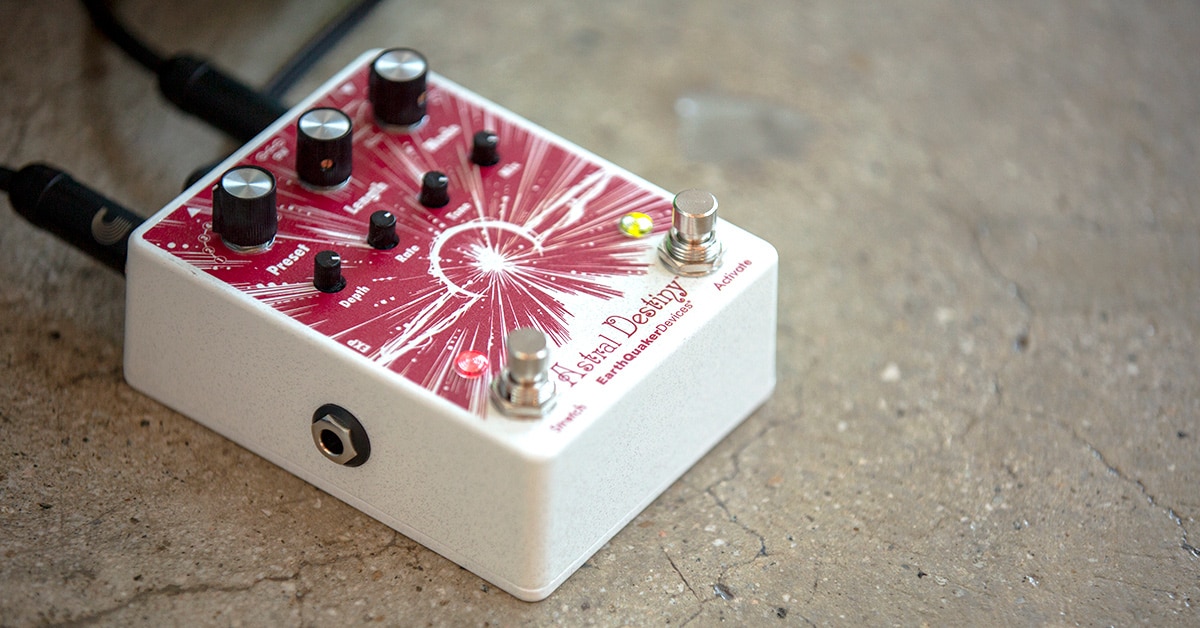Kicking off 2021 with a wash of sonic inspiration, EarthQuaker Devices has introduced the Astral Destiny. Astral Destiny is a powerful modulated octave reverb pedal, offering some of what you’d expect, and a lot of what you wouldn’t. We reached out to Jamie Stillman, founder and President of EarthQuaker Devices to learn more about how it came together.
The HUB: Hey, Jamie! So, how far back does the Astral Destiny project stretch back?
Jamie Stillman: I think I started working on it at the end of 2017 or early 2018.
The HUB: What was the impetus for this pedal? Was there a “Big Bang” moment?
JS: The Sub mode really started it heading in the direction of the final product. Prior to that it was experimenting with different types of modulation within the reverb algorithm.
The HUB: How did the design evolve over time?
JS: The earliest version of the Astral Destiny was wildly different. It was smaller, had none of the same modes and none of the digital control or presets. It focused more on the modulation than the reverb or combined package. Some of those effects were really cool and will probably find a home in a product in the future.
The HUB: Presumably a lot of this happened in isolation due to COVID-19. How did that impact or change your design and development process?
JS: Most of the major development was done pre-COVID so it didn’t affect it too much. My assistant, Matt Marton, had a major hand in the development of Astral Destiny so we just emailed files back and forth and dropped protos off at the shop for each other during the final testing and tweaking stage.
The HUB: There’s a lot going on here – reverb, octaves, chorus and pitch bending. How do design each part so they all work in a complimentary and musical way?
JS: Once I had the first octave program done I kind of knew how the others would fall into place. The primary objective was getting a nice reverb followed by getting the octave to sit right within it. The modulation was the final stage in the audio development and took a lot of work to get it to sound right with both the octave and the reverb. The real work came in all the digital control for stretch, presets, switching, EXP control, etc. That really took a lot of planning and was a bulk of the work.
The HUB: How does this compare to some of your other reverb and modulation pedals?
JS: It’s more experimental and cavernous than Ghost Echo or Levitation which are more spring-style reverbs. I think it’s more straightforward than Afterneath in that it’s easier to find a place for it within a song but it’s also way more advanced and versatile with all of its features and modes. None of them are based on each other, they are all completely different algorithms with different objectives in mind.

The HUB: Do you ever envision a specific player or player archetype when designing a pedal?
JS: Not really, no. This one will be better suited for the ambient-type player but it really will work in any context you feel comfortable putting it in.
The HUB: Over the years, your pedals have been widely adopted by synth players - you even include synth demos on some of your product pages. How did this impact the design of Astral Destiny?
JS: I design for guitar first, if it works well with other instruments that’s just an added bonus!
The HUB: What’s your favorite mode?
JS: It changes constantly but right now it’s either Astral or Cosmos.
The HUB: How do you “break things” and make this pedal do a little bit of the unexpected?
JS: Haha! A lot of trial and error. Usually I’ll hear something and think, “I know that’s a problem I should fix, but maybe if I make it worse it might sound cool.” [laughs] Sometimes I’m right, but I’m usually wrong.
The HUB: Any fun signal chains that people should try?
JS: I like it before another reverb or delay for maximum wash. Also, while this is not really a pedal combo, you can make you own modulation by using the momentary feature of the Stretch footswitch turning it on/off over and over and that is pretty awesome, too!
The HUB: Cool! Well, that's all we've got for now. Thanks for your time, Jamie.







































































































































